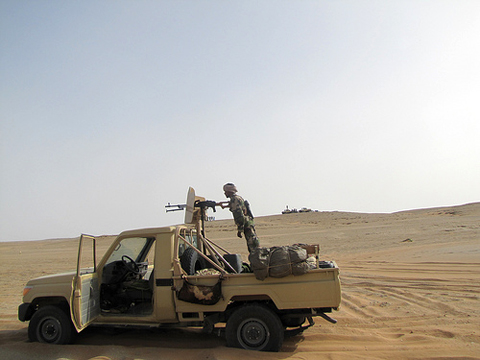
In reaction to the November 2011 kidnapping and killings of EU nationals in Northern Mali, Catherine Ashton, the High-Representative of Foreign Affairs and Security Policy for the EU, stated that: ‘These incidents show the need to continue and intensify the efforts against insecurity in the Sahel. Through its Strategy for Security and Development in the Sahel, the EU is committed to help the Sahel countries in this endeavor.” Nevertheless, the complexity of the terrorist threat in the Sahel region, and its connection to transnational criminal activities, makes me wonder whether the EU counter-terrorism strategy for the Sahel region is fit to confront this challenge.
The terrorist threat in the Sahel region is mainly posed by al-Qaeda in the Islamic Maghreb (AQIM). AQIM has its origins in the Algerian Groupe Salafiste pour la Prédiction et le Combat (GSPC). Largely as a result of the effectiveness of the Algerian army’s counter-terrorism strategy, GSPC was forced to move its headquarters to northern Mali, where it associated itself with al-Qaeda in 2007. The GSPC — rebranded as AQIM — targets the foreign presence in the region, mainly kidnapping European tourists in order to destabilize the Algerian government and convince Western governments to withdraw their troops.
What makes the group a difficult target is its pragmatic strategy. Though AQIM often seems to be acting in accordance with the ideals it espouses, it is highly sensitive to ransoms. A case in point is the 2010 kidnapping of Areva employees in Niger, in which AQIM originally demanded the withdrawal of French troops from Afghanistan and the repeal of its headscarf law, but then released three of the seven hostages in exchange for ransom payments. Opportunistically, AQIM has also expanded its theater of operations southward, linking up with the violent Nigerian group Boko Haram and striking deals of convenience with local groups like the Tuaregs in northern Mali. More importantly, AQIM collaborates with criminal networks, creating a ‘political economy’ of terrorism, in which terrorist operations are pursued in support of large-scale illicit financial activities and drug-trafficking. The group is also said to have helped the FARC transport cocaine through the Sahel and supposedly held a ‘drug summit’ with the FARC in Guinea-Bissau in late 2010.
Far from weakening the organization by corrupting its ideals, this pragmatism is proving to be a source of strength. AQIM can now ‘buy’ the loyalty of its members and does not have to rely on its ideological appeal alone. This means that counter-radicalization efforts will not do much to prevent youngsters from being recruited. But AQIM’s pragmatism has also not prevented it from expanding its network on an ideological basis. The link between the FARC and AQIM, for instance, is not only one of convenience but has a significant ideological aspect as well. AQIM members that were prosecuted in the US in December 2010 for conspiracy to commit acts of narco-terrorism testified that AQIM was collaborating with FARC not only for the money but also because both the FARC and AQIM “were committed to the same anti-American cause”.
Both terrorist and criminal networks profit from the fragility of the states in the Sahel region, building on existing weaknesses to further their goals. Criminal networks have supposedly infiltrated the state. State officials are said to be involved in criminal activities at local and regional levels, but possibly also at the national level. Intermediaries that were sent by the Malian government to negotiate the release of hostages are rumored, for example, to have received a cut of ransom payments, implying that north African governments are playing a more complicated game than expected. If criminal networks have indeed infiltrated the state, cleaning up the “black holes” in the Sahel region will not be as straightforward as it seems. Of course, EU policy-makers were well aware of these problems and have tried to develop a ‘comprehensive’ counter-terrorism strategy, with due attention to the ‘root’ causes of terrorism in political tensions and government corruption or involvement with criminal networks. The EU mainly builds upon existing national and regional initiatives like the ambitious Malian Programme spécial pour la paix, la sécurité et le développement dans le Nord-Mali (PSPSDN) in order to increase local ownership of the strategy and hopefully its effectiveness.
Nonetheless, regional tensions obstruct effective counter-terrorism and counter-criminality measures. France’s efforts to help Malian authorities find kidnapped French citizens were far from appreciated by Algeria, much like the release of AQIM prisoners by Malian authorities, allegedly under pressure from French and Spanish authorities. Mali also suspects the Algerian government of supporting the Tuareg rebellion, while the Algerian government suspects the Malian government of complicity with criminal networks. The noteworthy effort to establish a joint- command center has so far not led to any joint operations.
Further complicating matters, criminal activities can also fuel local conflicts. In Mali, in January 2010, the (Arab) Berabiche and (Tuareg) Imghad tribes temporarily abducted the chief of the (Arab) Kounta tribe over a cocaine clash. Not only can conflicts such as these destabilize the region themselves, they can also be exploited by national governments to suppress political opposition in the name of terrorism. A case in point is the Moroccan government’s alleged manipulation of the connection between Polisario and AQIM.
Finally, the chaos of the Libyan conflict — together with existing ethnic and political tensions and bad economic circumstances — could contribute to the resurgence of the Tuareg rebellion, strengthen groups like Boko Haram and provide AQIM with well-trained recruits.
Apart from making the counter-terrorism strategy for the Sahel region comprehensive and focusing more on criminality and corruption, the EU would be well advised to very carefully distinguish between the claims of legitimate political opposition groups and those of terrorists and insurgents, and to make sure that fighters returning from the Libyan conflict are either inserted into existing security forces, or provided with viable alternatives. In any case, the EU should avoid being party to political games that could drive people into the arms of terrorist groups.

